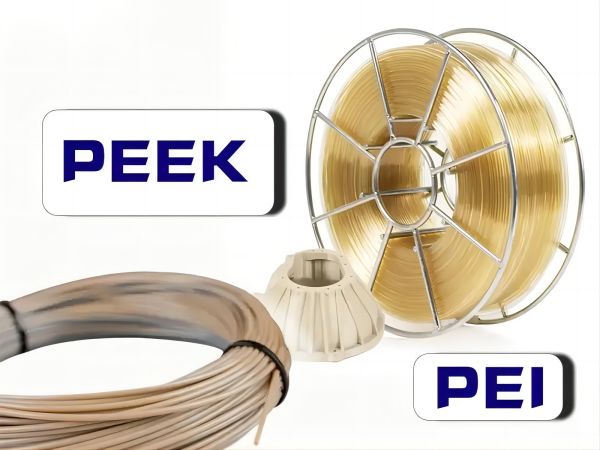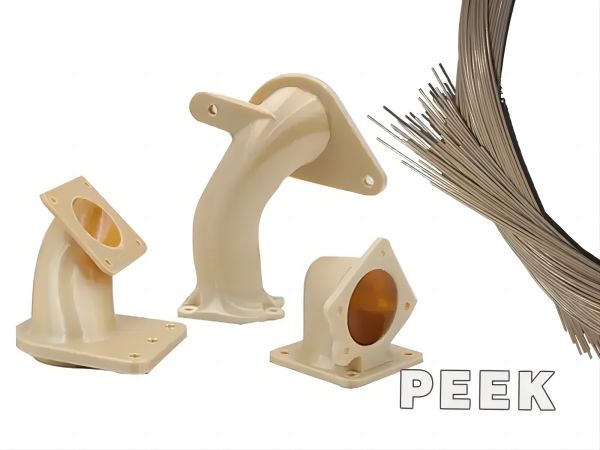
Privacy statement: Your privacy is very important to Us. Our company promises not to disclose your personal information to any external company with out your explicit permission.
Hard and friction-resistant: what are the differences between the superior properties and applications of PEEK fine wire and PEI fine wire?
When comparing PEI filaments to PEEK filaments, we find that the two are similar in many ways, but there are also some key differences. Simply put, PEI filament can be thought of as the little brother of PEEK filament, and while there are many similarities in performance between the two, PEEK filament outperforms in a number of areas.
Both exhibit excellent heat resistance, chemical resistance and tensile strength. However, PEEK is superior in all of these areas. Whether it's strength, heat resistance, chemical resistance or fatigue resistance, PEEK is superior.

Moisture Deformation Resistance and Smoke-Free Combustion Characteristics
Both PEEK and PEI are highly resistant to moisture distortion, which means that they maintain their shape stability in humid environments. In addition, both materials do not produce smoke when burned, a characteristic that is very useful in high temperature environments.
Through stress and crack resistance
They both have excellent stress and crack resistance, which means they can withstand a wide range of stresses and are less likely to crack or break when subjected to repeated use or extreme environmental conditions. Both materials are rigorously tested and verified to ensure they have the strength and durability they need.
Hard and Friction Resistant
Both materials are extremely hard, which means they are not easily deformed or damaged when subjected to pressure or friction. In addition, PEEK is also very resistant to friction, which allows it to be used in a variety of heavy industrial applications, such as making parts like bearings or gears. While PEI is also very strong, it has relatively low friction resistance.
Printing Difficulty and Temperature Resistance
During the printing process, PEI filaments are relatively easier to handle, while PEEK filaments are relatively more difficult to print. This is because PEEK has a higher melting point and requires a higher printing temperature. However, PEEK has higher temperature resistance and is able to maintain its physical properties and mechanical properties at higher temperatures.
Cost Considerations
Last but not least are cost considerations. while PEI filament is relatively low cost, PEEK filament is one of the most expensive 3D printing consumables known. Therefore, cost-effectiveness and budgetary constraints need to be considered when choosing between these two materials. If your project requires a high volume of 3D printing consumables, then PEI may be a more economical choice. However, if you need higher performance and high temperature resistance properties, then PEEK may be a better choice.

There are some differences between PEI filaments and PEEK filaments in terms of performance, printing difficulty, and cost. While they have many similarities, PEEK performs better in many areas. However, cost and print difficulty are important factors to consider. Therefore, the choice between these two materials needs to be weighed and decisions made based on your specific needs.
November 17, 2024
November 16, 2024
August 27, 2021
August 26, 2021
PEEK ball is a special type of ball made of polyether ether ketone (PEEK), which has excellent chemical stability, abrasion resistance, and high temperature resistance.PEEK ball is widely used in...
PVDF Application Areas Different models of PVDF products are suitable for different application scenarios. According to application fields, PVDF can be divided into conventional grade products and...
Application Performance Advantages of MC nylon MC nylon is a new type of engineering plastics, due to its outstanding comprehensive performance, so that its status in engineering plastics is rapidly...
Types of nylon: 1. Nylon - 6 (PA6) Nylon -6, also known as polyamide -6, that is, polycaprolactam. Translucent or opaque opalescent resin. 2. Nylon - 66 (PA66) Nylon-66, also known as polyamide-66,...
Email to this supplier
November 17, 2024
November 16, 2024
August 27, 2021
August 26, 2021

Privacy statement: Your privacy is very important to Us. Our company promises not to disclose your personal information to any external company with out your explicit permission.

Fill in more information so that we can get in touch with you faster
Privacy statement: Your privacy is very important to Us. Our company promises not to disclose your personal information to any external company with out your explicit permission.